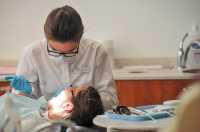Author Interviews, Heart Disease, Infections, Opiods / 18.03.2019
Opioid Crisis Linked To Rapid Increase in Chronically Infected Heart Valves
MedicalResearch.com Interview with:
Serena Day, MD
Ohio State University
MedicalResearch.com: What is the background for this study? What are the main findings?
Response: The idea for this research came from my own observations of patients that I was caring for in the hospital first as an Internal Medicine Resident and now as a senior Cardiology Fellow. I did my residency here at Ohio State and noticed a marked increase in the number of patients with endocarditis that we were caring for just in my short time here as a trainee.
Over 5 years, we saw an increase of 436% in intravenous drug use related endocarditis. How this disease is treated as changed as well. It used to be that if a patient was a good surgical candidate, we would offer a replacement valve. Now, we see that these patient's have such a high rate of recurrent intravenous drug use and reinfection of their heart valves that we now treat with antibiotics only rather than surgery. In many cases, the infection never goes away because we can't offer definitive therapy with surgery due to their high relapse and reinfection rates of nearly 50%.
(more…)





